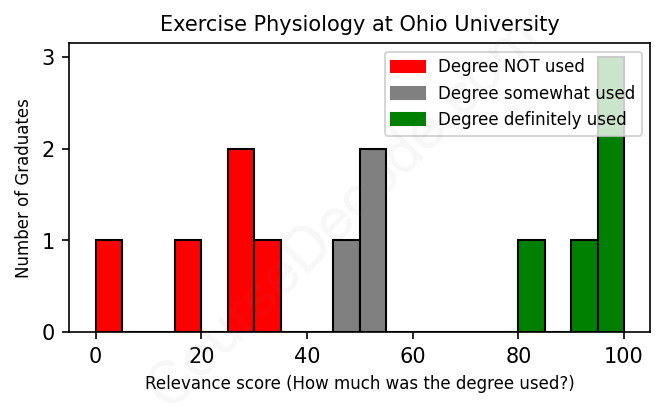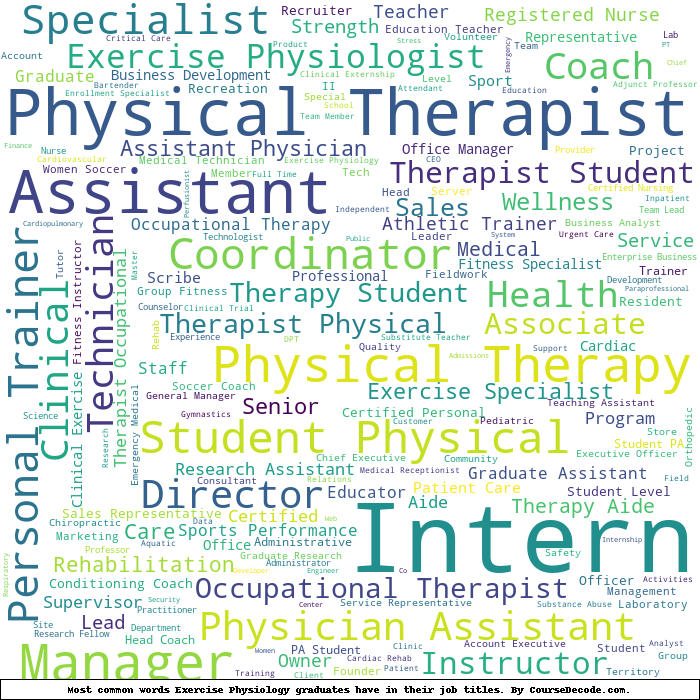
First, some facts. Of the Exercise Physiology graduates from Ohio University we've analyzed , here's how many have used (or NOT used) their degree in their career:

These are estimates based on AI analysis of 13 LinkedIn profiles (see below).
The verdict? Significantly below average. Overall, with an average relevance score of 55%, Exercise Physiology graduates from Ohio University have a much lower likelihood (-12%) of finding work in this field compared to the average graduate across all fields:
And for comparison, here's the chart for all profiles we've looked at across all degrees.
Also, after graduating, 53% of these graduates have pursued further education other than another Bachelor's degree (such as a Masters degree or other), compared to the average across all profiles of 35%. This suggests you may need more than just a Bachelors degree to be competitive as a Exercise Physiology graduate.
See the details:
|
Relevance score: 90% We think this person has gone into a career highly relevant to their degree. We think this person has gone into a career highly relevant to their degree.
DEGREE INFOGraduated in 2012 from Ohio University with a Bachelor's degree in Exercise Physiology. No other secondary education since. JOB HISTORY SINCE GRADUATIONExercise Specialist Nardone Chiropractic & Wx Jun 2012 - May 2014 Exercise Specialist  Miller Chiropractic and Wellness Jun 2014 - Sep 2017 Exercise Specialist  Goldbaugh Chiropractic Nov 2018 - Oct 2022 Health Fitness Specialist  Corporate Fitness Works Oct 2022 - Present Rec Acitivites Coordinator  Corporate Fitness Works Apr 2024 - Present ABOUTNo information provided. |
The top 10 most common jobs done by the graduates we've analyzed (ranked most common to least) are:
After checking out a bunch of LinkedIn profiles of folks who graduated with degrees in Exercise Physiology from Ohio University, it looks like there's a mix of careers they’ve landed in. The most common roles they seem to take on are Exercise Specialist positions, where they can really use what they learned in school about exercise programming and rehabilitation. These jobs appear to be highly relevant to their educational background. On the flip side, many graduates are also ending up in roles that are pretty far from exercise physiology, such as bartenders, nursing students, and general managers at various places. These positions don’t really require any specialized knowledge of exercise physiology at all.
Overall, while some graduates have found jobs that directly relate to their studies, like Physical Therapists and Personal Trainers, a decent number have drifted into fields that basically ignore their degree. This could mean that there might not be enough job opportunities in exercise physiology itself, or it could suggest that some graduates are just exploring different career paths. So, while those who stick to Fitness or Rehab fields seem to be using their skills well, others are definitely off doing completely different things. It's a mixed bag for sure!
Here is a visual representation of the most common words in job titles for Exercise Physiology graduates (this is across all Exercise Physiology graduates we've analyzed, not just those who went to Ohio University):

Graduates from Ohio University with a degree in Exercise Physiology seem to have quite a mixed bag of career trajectories. Right out of college, many seem to land jobs that are directly related to health and fitness, like Exercise Specialists and Personal Trainers. For instance, graduates from 2012 went straight into roles as Exercise Specialists in various clinics, while those from 2018 worked as Personal Trainers at the YMCA. This is a promising sign for new grads looking to kickstart their careers in the fitness and health sector. However, as we look five to ten years down the line, the picture starts to get a bit murky. While some have moved into more specialized roles, such as Physical Therapists or Occupational Therapists, others have drifted away from the field and taken on jobs in management or entirely different industries, such as property management and account executive positions.
It's interesting to see how diverse their paths can become over time. Some folks who started off in relevant exercise physiology jobs have made transitions into broader health and wellness roles, while others seem to have completely shifted gears into fields like tech and management. This indicates that while a degree in Exercise Physiology provides a solid foundation for entering health and fitness careers, it doesn't strictly bind graduates to those specific fields. The results are a bit of a mixed review; if you're hoping to stick closely to exercise physiology, there’s definitely a pathway, but it’s not uncommon for people to veer off into other career areas as they gain experience and chase new opportunities. Overall, for those interested in careers in exercise physiology, there are definitely routes to success, but some also find themselves exploring broader openings over time.
Honestly, a Bachelor’s degree in Exercise Physiology can be a mixed bag in terms of difficulty. At Ohio University, or really anywhere else, it’s not the easiest path because you’ll dive into a lot of science courses, like biology and anatomy, which can be pretty challenging if that's not your strong suit. You’ll also have to get comfy with some math and stats, especially when you're learning about exercise testing and research methods. But! If you’re passionate about fitness and health, that interest can help you push through the tougher classes. Overall, I'd say it’s a bit harder than some other liberal arts degrees but definitely doable if you're willing to put in the effort and stay organized!
Most commonly, in the LinkedIn profiles we've looked at, it takes people 4 years to finish a Bachelor degree in Exercise Physiology.
Looking at these Ohio University Exercise Physiology grads, it seems like they're mixed bag when it comes to making decent money. Some, like the occupational therapists and physical therapists, probably have pretty solid incomes, especially given the demand for their skills in healthcare. Others, like the personal trainers and coaches, might not be making as much, especially if they’re in smaller programs or schools. A few have worked their way up in various fields, like management roles in hospitality, which can pay fairly well, but it’s hard to say if they’re raking it in. Overall, there’s definitely some cash flow for some folks, but it also looks like a lot of them are still figuring out their best path to that sweet paycheck.
Here is a visual representation of the most common words seen in the "about" section of LinkedIn profiles who have a Bachelor degree in Exercise Physiology (this is across all Exercise Physiology graduates we've analyzed, not just those who went to Ohio University). This may or may not be useful:

Here are all colleges offering a Bachelor degree in Exercise Physiology (ordered by the average relevance score of their Exercise Physiology graduates, best to worst) where we have analyzed at least 10 of their graduates:
| College | Score | Count |
|---|---|---|
 East Carolina University East Carolina University
|
70 | 15 |
 California State University-Chico California State University-Chico
|
70 | 11 |
 University of Massachusetts Lowell University of Massachusetts Lowell
|
66 | 15 |
 West Virginia University West Virginia University
|
63 | 23 |
 University of Miami University of Miami
|
59 | 11 |
 Florida State University Florida State University
|
55 | 22 |
 Ohio University Ohio University
|
55 | 13 |
 Brigham Young University - Idaho Brigham Young University - Idaho
|
40 | 21 |